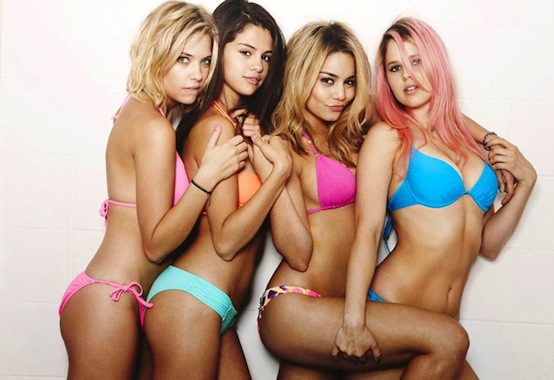What Does the Conservative Media Think of ‘Spring Breakers’?

I saw “Spring Breakers” this weekend. Unlike Rod, I’m actually a pretty big fan of Harmony Korine and awaited the film’s release with some anticipation.
After reading John Podhoretz’s predictable review, it got me thinking, what does the rest of the conservative web think about such a trashy, lurid film? It’s an almost perfect target–former Disney stars take the lead in a sexploitation flick with art-film pretensions.
Turns out, not much. I was hoping this Chuck Norris column entitled “Spring Break, Sexual Predators, Cartels, and Your Kids” would mention it, but instead he just presents tips for avoiding drug cartels while vacationing in Mexico.
NewsBusters and Religion Today were aghast at the stars’ Disney connections, with their racy new roles suggesting “a greedy passion to shed their childhood acting past.” But that innocent child-star past was the very thing Korine tried to destroy, right down to his choice of shots.
Debbie Schlussel says, with her usual blend of moderation and critical insight, “every single person involved with this movie is a complete scumbag unworthy of human life” and gives it “four Marxes plus four Obamas plus four Bin Ladens” which must mean it’s really bad. Some Breitbart guy didn’t really get it so he isn’t worth quoting.
Forbes‘ Dina Gachman asks an important question; “was this a shrewd career move for these women [Selena Gomez, Vanessa Hudgens, Ashley Benson], or are they just letting some pervy male filmmaker exploit them?” She decides it’s the latter because none of the girls really get to show off their acting chops, which begs the question of whether or not they actually have them. Yet there’s a third option, which I admit is not supported by anything the actresses have said about their roles so far.
I find myself wanting to believe the young actresses are in on the joke–not just that they know their characters are behaving stupidly but that their stupidity isn’t at all unusual. That taking on the role was a knowing, dare I say sacrificial, attempt to point that out. Perhaps it’s to the director’s credit that they never act that way.
Podhoretz almost gets it when preemptively criticizes those who would praise the “incantory quality” of repeated lines like “spring break forever” and others, “that its repetitions are purposeful because they highlight the banality of its characters.” See, it’s not the characters so much as the viewers. I’ve heard every single one of those phrases come out of the mouths of peers. That crazy things happened to the girls on their Spring Break doesn’t mean their reasons for going aren’t, if not universal, at least generational–“I just want to get out of here. There’s more than just spring break. This is our chance to see something different.”
Faith, the source of that quote, is supposed to be the one contrasting pillar of morality among the four girls, but her religion is portrayed as just as superficial as everything else in the movie. In an early scene, she sits on yoga mats with a Bible study group, bored, singing the “Amen” song and listening to a pastor in a muscle shirt with a tattoo-art cross sigh and exhale in the spirit. Sure it’s mocking, but in this film what isn’t? Later she calls their destination “the most spiritual place I’ve ever been,” which seems almost understandable, given her spiritual roots.
Sonny Bunch has the best conservative take on “Spring Breakers,” and says it is, “in its way, a deeply reactionary film.” (Meanwhile, Judy Berman criticizes its “bizarre conservatism,” and some New York Times reader describes its “privileged slumming and entitled voyeurism” as “the most conservative form of filmmaking.”) He reflects:
Faith is at first the subject of mockery for attending a church youth group. As the film progresses, however, it turns out her pastor has armed her with enough common sense to get out of a bad situation. In this regard, Spring Breakers calls to mind Kids (which Korine wrote) and Lee Hirsch’s Bully, pictures that also wallowed in the breakdown of social norms while expressing disgust at such decadence. Some may criticize Korine for indulging in trash to prosecute his argument, but they are missing the point. When you’ve spent decades crawling through grime, it makes little sense to get angry at the mirror for reflecting filth.
“Educated liberals will be sharing theater seats with tweens and bros,” writes Lorian Long at TMT, about Korine’s first wide-release film and first commercial success. What’s so genius about that is even on a basic level you can’t be sure which one’s the sucker–the chin-stroker searching for meaning or the kid who’s there for a pornographic thrill. Probably both.
Comments